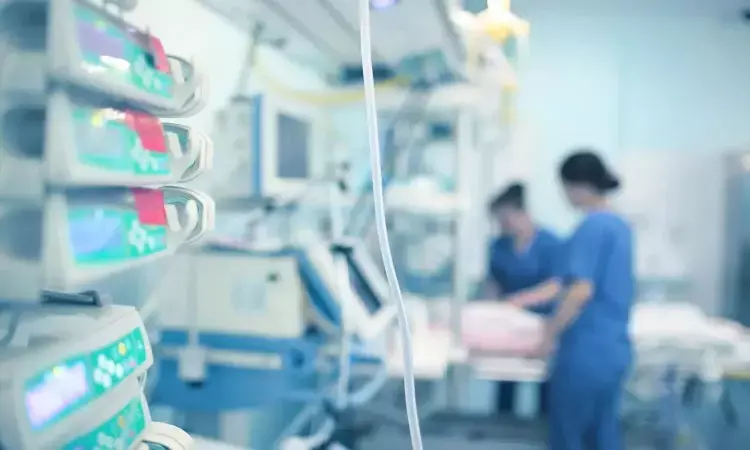- Home
- Medical news & Guidelines
- Anesthesiology
- Cardiology and CTVS
- Critical Care
- Dentistry
- Dermatology
- Diabetes and Endocrinology
- ENT
- Gastroenterology
- Medicine
- Nephrology
- Neurology
- Obstretics-Gynaecology
- Oncology
- Ophthalmology
- Orthopaedics
- Pediatrics-Neonatology
- Psychiatry
- Pulmonology
- Radiology
- Surgery
- Urology
- Laboratory Medicine
- Diet
- Nursing
- Paramedical
- Physiotherapy
- Health news
- Fact Check
- Bone Health Fact Check
- Brain Health Fact Check
- Cancer Related Fact Check
- Child Care Fact Check
- Dental and oral health fact check
- Diabetes and metabolic health fact check
- Diet and Nutrition Fact Check
- Eye and ENT Care Fact Check
- Fitness fact check
- Gut health fact check
- Heart health fact check
- Kidney health fact check
- Medical education fact check
- Men's health fact check
- Respiratory fact check
- Skin and hair care fact check
- Vaccine and Immunization fact check
- Women's health fact check
- AYUSH
- State News
- Andaman and Nicobar Islands
- Andhra Pradesh
- Arunachal Pradesh
- Assam
- Bihar
- Chandigarh
- Chattisgarh
- Dadra and Nagar Haveli
- Daman and Diu
- Delhi
- Goa
- Gujarat
- Haryana
- Himachal Pradesh
- Jammu & Kashmir
- Jharkhand
- Karnataka
- Kerala
- Ladakh
- Lakshadweep
- Madhya Pradesh
- Maharashtra
- Manipur
- Meghalaya
- Mizoram
- Nagaland
- Odisha
- Puducherry
- Punjab
- Rajasthan
- Sikkim
- Tamil Nadu
- Telangana
- Tripura
- Uttar Pradesh
- Uttrakhand
- West Bengal
- Medical Education
- Industry
Dexmedetomidine use efficacious for reducing PTSD during emergency trauma surgery

China: Findings from a randomized clinical trial of 310 patients support the perioperative use of dexmedetomidine for reducing the incidence of posttraumatic stress disorder (PTSD) in trauma patients undergoing emergency surgery.
The study published in JAMA Network Open posttraumatic stress disorder occurred in 14.1% of patients in the dexmedetomidine group and 24.0% in the control group 1 month postoperatively.
People with trauma commonly experience posttraumatic stress disorder, particularly those hospitalized for surgery. Dexmedetomidine may lessen or reverse the early consolidation and formation of conditioned fear memory and postoperative PTSD occurrence. Youjia Yu, Suzhou Xiangcheng People's Hospital, Suzhou, China, and colleagues aimed to evaluate the effects of intraoperative and postoperative low-dose intravenous pumping dexmedetomidine on PTSD among trauma patients undergoing emergency surgery in a double-blind, randomized clinical trial conducted from January 22 to October 20, 2022.
The study, with a follow-up one month postoperatively, included patients with trauma undergoing emergency surgery at four hospital centres in China. A Screening of a total of 477 participants was done. The observers were blinded to patient groupings, specifically for subjective measurements.
Three hundred ten patients (mean age, 40.2 years; 57.7% men) were randomized to the dexmedetomidine group (n=156) or the placebo (normal saline group; n=154) and were included in the modified intention-to-treat analysis. Dexmedetomidine or placebo was administered at a maintenance dose of f 0.1 μg/kg hourly from anaesthesia start until the end of surgery and at the same rate after surgery from 9 pm to 7 am on days 1 to 3.
The authors reported the following findings:
- The incidence of PTSD was significantly lower in the dexmedetomidine group than in the control group 1 month postoperatively (14.1% vs 24.0%).
- The participants in the dexmedetomidine group had a significantly lower CAPS-5 score than those in the control group (17.3 versus 18.9; mean difference, 1.65).
- After adjusting for potential confounders, the patients in the dexmedetomidine group were less likely to develop PTSD than those in the control group 1 month postoperatively (adjusted odds ratio, 0.51).
"In this randomized clinical trial, intraoperative and postoperative dexmedetomidine administration reduced the PTSD incidence among trauma patients," the authors wrote. "The trial findings support dexmedetomidine use in emergency trauma surgery."
"Therefore, we recommend low-dose dexmedetomidine sedation during and after surgery for trauma patients under suitable conditions," they concluded.
Reference:
Yu Y, Li Y, Han D, et al. Effect of Dexmedetomidine on Posttraumatic Stress Disorder in Patients Undergoing Emergency Trauma Surgery: A Randomized Clinical Trial. JAMA Netw Open. 2023;6(6):e2318611. doi:10.1001/jamanetworkopen.2023.18611
Dr Kamal Kant Kohli-MBBS, DTCD- a chest specialist with more than 30 years of practice and a flair for writing clinical articles, Dr Kamal Kant Kohli joined Medical Dialogues as a Chief Editor of Medical News. Besides writing articles, as an editor, he proofreads and verifies all the medical content published on Medical Dialogues including those coming from journals, studies,medical conferences,guidelines etc. Email: drkohli@medicaldialogues.in. Contact no. 011-43720751


